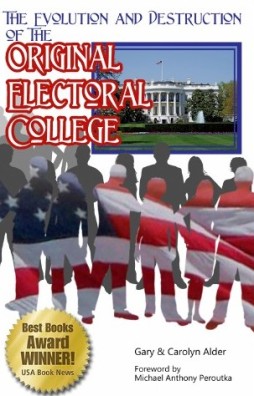The national government was to deal with the states and other nations; the states and local governments were to deal with the people.
Key 9 Analysis
The United States Constitution was wisely designed to be the controlling document for the national government or the federal government as we call it today. In 1787, federal pertained to a league, alliance, or contract derived from a mutual agreement or covenant between parties, or particular states or nations. The Articles of Confederation, the document which preceded the U.S. Constitution, was a league of the thirteen sovereign states. The Founders also used the word federalism to mean shared powers; delegating specific powers to several levels of government such as the local communities, and states, and the central government.
A national government referred to a powerful consolidated government of the nation, which the Founders were careful to avoid. The Framers were afraid of consolidated powers at the national level; they believed in order to have freedom, most of the powers needed to be retained by the people in their local communities. They did not want the highest levels of government to be too powerful in respect to their involvement in the lives of individuals. They knew from history and from experience that they would loose freedom if excessive force were allowed to a central government.
Dr. W. Cleon Skousen describes the Founders philosophy in his Principles of Liberty # 21, “Strong local self government is the keystone to preserving human freedom.”
Modern usage has redefined the terms and the concepts today calling Washington D.C. the Federal Government. We personally wish it was a federal government today as a league of the states and with shared powers, rather than the tightly consolidated, all powerful, national government, which has usurped almost all power from the states and the people. More people are starting to recognize this situation now as many groups are forming to try to regain individual and local sovereignty.
The brilliant structure of the Constitution, which the Framers designed and the people of the states ratified, outlined the delegated powers given to the United States government. It explained what could and could not be done. It was expected that each separate branch would be jealous of the prerogatives vested in them, and not permit the other branches to usurp their jurisdiction.
The Constitution, which was the “more perfect union” of the States, delegated to the national government, usually referred to as the central or general government, powerful prerogatives in a few specific areas. The national defense, international relations, payment of national debts, regulating the standard and value of money, weights and measures, helping to resolve issues between the states, etc. were necessary duties for the national government. The government needed to be very powerful when it comes to war and defending this nation. It needed enough power to tax the states to cover the war debt and run the few delegated functions of the central government. The tax required was to be assessed among the individual states to share the expenses according to their population. The national government had no power to directly tax the individual people within the states.
The national government needed authority to manage the affairs of the United States in relation to other nations of the earth. The general philosophy of many of the Founders is reflected in the statement of Thomas Jefferson “Peace, commerce, and honest friendship with all nations, entangling alliances with none.”
The national government also needed to be able to be an impartial third party, an arbitrator for the states to appeal to, when there were problems between states such as border disputes, commerce between states, etc.
The national government was not designed to have any direct relationship with the people; that was left to the states. “To promote the general welfare meant the well-being of the nation as a whole, not specific groups or individuals. It did not refer to the dole system as it does today.
The Constitution did not give power to the national government to take over the economy, businesses, education, employment, housing, wages, health care, or other domestic concerns. All domestic issues were to be handled by the local governments with the states being the highest level.
In forming the new “more perfect union,” the States gave up some of their former prerogatives and allowed some limitations to be placed upon them.
James Madison certainly understood the threat of centralized government power, writing in Federalist No. 45 he said:
“The powers delegated by the proposed Constitution to the federal government, are few and defined. Those which are to remain in the State governments are numerous and indefinite. The former will be exercised principally on external objects, as war, peace, negotiation, and foreign commerce; with which last the power of taxation will, for the most part, be connected. The powers reserved to the several States will extend to all the objects which, in the ordinary course of affairs, concern the lives, liberties, and properties of the people, and the internal order, improvement, and prosperity of the State.”
James Madison Federalist 45 Jan. 26, 1788
Sadly, we have forgotten the proper role of government and the purpose of our Constitution, as most of the issues our national government is dealing with today, amount to micro managing the lives of the people. We cannot be an independent nation and have people dependent on the government, supporting and running their lives.
Quotes
[T]he government of the United States is a definite government, confined to specified objects. It is not like the state governments, whose powers are more general. Charity is no part of the legislative duty of the government. James Madison, speech in the House of Representatives, January 10, 1794
* * *
Were we directed from Washington when to sow, and when to reap, we should soon want bread. Thomas Jefferson, Autobiography 1821
* * *
(T)he States can best govern our home concerns and the general government our foreign ones. I wish, therefore…never to see all offices transferred to Washington, where, further withdrawn from the eyes of the people, they may more secretly be bought and sold at market. Thomas Jefferson, letter to Judge William Johnson, June 12, 1823.
* * *
The essence of Government is power; and power, lodged as it must be in human hands, will ever be liable to abuse. James Madison
* * *
If Tyranny and Oppression come to this land, it will be in the guise of fighting a foreign enemy. James Madison
* * *
With respect to the words ‘general welfare,’ I have always regarded them as qualified by the detail of powers connected with them. To take them in a literal and unlimited sense would be a metamorphosis of the Constitution into a character which there is a host of proofs was not contemplated by its creators. James Madison
* * *


